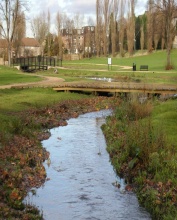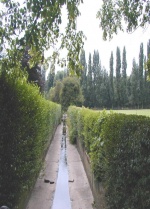Case study:River Quaggy- Chinbrook meadows: Difference between revisions
Hazel Wilson (talk | contribs) No edit summary |
Hazel Wilson (talk | contribs) No edit summary |
||
| Line 178: | Line 178: | ||
{{Additional links and references header}} | {{Additional links and references header}} | ||
{{Additional links and references | {{Additional links and references | ||
|Link=www.therrc.co.uk/sites/default/files/projects/ | |Link=www.therrc.co.uk/sites/default/files/projects/p1499.pdf | ||
|Description=RRC site description | |Description=RRC site description | ||
}} | }} | ||
Revision as of 09:41, 17 February 2016
Project overview
| Status | Complete |
|---|---|
| Project web site | |
| Themes | Habitat and biodiversity, Social benefits, Water quality, Urban |
| Country | England |
| Main contact forename | Dave |
| Main contact surname | Webb |
| Main contact user ID | User:Ascarr |
| Contact organisation | Environment Agency |
| Contact organisation web site | http://www.environment-agency.gov.uk |
| Partner organisations | QWAG, Lewisham Council |
| Parent multi-site project | |
| This is a parent project encompassing the following projects |
No |
Project summary
This project is an excellent example of a partnership initiative that has not only restored the river and floodplain, but has also paid careful attention to improving the park amenities. The channel work was completed in spring 2002 and by September that year there had already been considerable movement of gravels. Natural geomorphological features including a pool/riffle sequence, gravel bars and steeper banks had formed. The pond has been colonised by invertebrates and the vegetation planted along the banks is now providing good cover in both the planted and unplanted sections.
Site background This section of the River Quaggy, with a flashy flow regime, was channelised and straightened between 1960-1970 as part of a flood alleviation scheme. Prior to restoration it was encased in concrete with fences and high privet hedges near to each bank. It could neither be accessed nor viewed by the public and was devoid of natural fauna and flora.
Objectives To reintroduce the floodplain as a natural flood storage area as part of a larger catchment flood alleviation plan; to enable the River Quaggy to become accessible to the public and hence create a local amenity; to create an environment where native fauna and flora could colonise and allow for natural channel processes.
Design
- The concrete channel in the park was replaced by a sinuous channel, allowing easy
access. It was (except where the cost of moving existing sewage drains prevented this) cut to follow its path prior to channelisation.
- Whilst cutting the channel old gravels were evacuated and sufficient ‘room’ was left
along the river corridor to allow for natural adjustment.
- The margins of the channel were planted using a reputable source of native wetland
plants (including iris, water mint and reeds), a wetland grass and wild flower mix was also sown. One section downstream has not been planted since there was a request from the local group to allow natural colonisation.
- Flood storage ponds were included in the scheme and at the upstream section a
boardwalk, pond dipping and educational area, were incorporated to attract local school children.
Monitoring surveys and results
Lessons learnt
Image gallery
|
Catchment and subcatchmentSelect a catchment/subcatchment
Catchment
Subcatchment
Other case studies in this subcatchment: Colfes School, Lidl, Manor House Gardens, Manor House Gardens Gauging Station, Manor Park, Mottingham Farm, Quaggy Flood Alleviation Scheme, Quaggy channel improvements, Sutcliffe Park, Sydenham Cottages Nature Reserve
Site
Project background
Cost for project phases
Reasons for river restoration
Measures
MonitoringHydromorphological quality elements
Biological quality elements
Physico-chemical quality elements
Any other monitoring, e.g. social, economic
Monitoring documents
Additional documents and videos
Additional links and references
Supplementary InformationEdit Supplementary Information
| ||||||||||||||||||||||||||||||||||||||||||||||||||||||||||||||||||||||||||||||||||||||||||||||||||||||||||||||||||||||||||||||||||||||||||||||||||||||||||||||||||||||||||||||||||||||||||||||||||||||||||||||||||||||||


